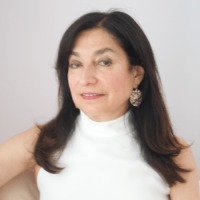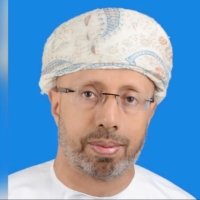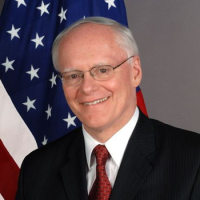The Middle East and North Africa in 2022: Regional Security and America’s Role
2022 will be a critical year in the Middle East and North Africa (MENA) region. Among the flashpoints: the world’s major powers are engaged in last-gasp diplomacy to contain Iran’s steadily advancing nuclear program, this week saw an extraordinary escalation with Houthi attacks against the United Arab Emirates, Lebanon’s economy and government have virtually imploded, and Libya, Syria, and Yemen are still embroiled in conflict, drawing in regional and international powers.
These new and emerging threats pose enormous challenges to policymakers in Washington, D.C. Although, the Biden administration, in its actions and public statements, appears committed to the classic American-led international security order. Whether it can leverage the United States’ remaining influence to achieve a sense of peace and security remains to be seen.
MEP’s distinguished panel tackled these challenges and highlighted opportunities for more U.S. engagement in the region.
Selected Quotes
Ambassador James Jeffrey
“In Northeast Syria, which has been pretty quiet, we have had a major outbreak of violence by ISIS, which we haven’t heard all that much of recently, with a prison break and extensive combat involving American infantry in post combat out of Bradley armored vehicle for the first time since we’ve deployed those vehicles to Northeast Syria.”
Robin Wright
“Even if we should get back to the 2015 deal, the danger is that Iran also has another front that is very worrisome and that is Iran’s missile program, which over the past five years… exceeded all expectations… Iran now has a missile that can hit 2000 kilometers away—deep into China to the east, Russia to the north, as far south as Ethiopia and Somalia, and as far west as Greece. There’s no country in the world that has a 2000-kilometer missile that doesn’t have a nuclear weapon.”
“Iran’s network of allies and proxies is arguably broader and better than at any time since the Revolutionary Guards fostered the creation of Hezbollah in 1982. Iran has not just identified partners to align with—which is the usual route to creating an alliance—it’s actually gone out into the region and created allies, which is in many ways… unprecedented.”
Geneive Abdo
“We have seen the street movement now enter the political sphere and this is very important because these young people who were on the streets of Iraq figured out that there were two trends of thought. One was to boycott the elections and that happened; a great number of activists and protesters were campaigning on a boycott—they boycotted the election. But then there was another school of thought who said: ‘if we want to reform the system then we have to participate in it.’ And again, they won seats. The result of this protest movement has been very significant, not only in terms of the future government formation of Iraq… but also in terms of Iran’s influence.”
“Lebanon unfortunately is much less of a success story. The civil society movement there was pushed back [and] defeated. I mean, we’re seeing Hezbollah emerge certainly in a much better position than they were two years ago—especially with the departure of Saad Hariri from the political scene, which we just saw in the last few days. So, there’s a huge Sunni vacuum in Lebanon that I think is being filled by some of the more corrupt and sectarian parties, such as Hezbollah.”
Michael Singh
“There’s not a lot of confidence that whatever the United States does is going to roll back Iran in a significant way. That will have implications for the region. It will have implications for example for proliferation… and I think in a world where you do have states like North Korea and Iran either crossing the nuclear threshold or coming up to it, in a world where the United States is seen as less reliable, will increasingly face proliferation challenges from allies and partners—not just from adversaries.”
“In the context of great power competition with Russia and China… it is easy to see the Middle East as a distraction from that focus. But I think that increasingly in fact the Middle East, as well as other regions in the world, are to some extent a theater—or an arena—for great power competition. China has moved much more significantly into the Middle East, especially economically – but not only economically. Just recently in the Wall Street Journal… the story about Chinese military construction—alleged military construction—in the United Arab Emirates, one of the United States closest security partners in the region.”
Abdullah Baabood
“I think Iran has changed a lot and we need to have a new way of looking at Iran and maybe engaging with it rather than trying to put it under maximum pressure, which we’ve seen. What has this led to? We’ve tried to close the roads for Iran, we’ve tried not to engage with them but they’ve found ways of engaging with us through conflicts and wars; and through supporting their proxies in the region.”
“The whole regional powers can work together towards peace, prosperity, human rights, and accepting each other on equal footing – and trying to find ways to collaborate and defend themselves. Without that, the region can still be open for international manipulation, regional power competition, internal struggles, and the challenges are huge.”
Event Summary
The unrelenting threat of Iran
The Islamic Republic of Iran poses myriad political and military concerns to the United States, as well as regional and global security. Most pressing is the country’s accelerating nuclear capabilities. Reviving the Joint Comprehensive Plan of Action (JCPOA) will have three vital consequences: prevent the proliferation of nuclear weapons across the Middle East, shore up the unraveling of the world’s nuclear order as deals from the 20th century continue to erode, and limit the potential for the Middle East region’s leading Sunni and Shia powers to seek nuclear weaponry (Saudi Arabia and Iran, respectively).
Failed diplomatic efforts could have immediate implications on regional security and stability. According to United States Secretary of State Antony Blinken, Iran is mere weeks from irreversible advancements in its nuclear capabilities. “The bottom line is [with] the Iranians, who are masters are brinkmanship, time is running out. We could maybe pull off a miracle at the end of the day, but I think the new regime in Tehran is felling quite heady. There is no guarantee at all that they will go back as they promised,” noted Robin Wright, USIP-Wilson Center Distinguished Fellow.
Great power competition
The Biden administration must also shape its Mideast foreign policy in the context of great power competition with Russia and China. “It is easy to see the Middle East as a distraction, but increasingly the Middle East is a theater, or arena, for great power competition,” argues Michael Singh, Lane-Swig Fellow and Managing Director at the Washington Institute for Near East Policy. Noting that Russian military sales and Chinese economic cooperation has greatly expanded.
Diplomatic efforts such as the Abraham Accords, that normalized relations between Israel and the UAE and Bahrain, offer an opportunity to the Biden administration to address deeper problems in the region, without investing as much time or resources. Regional integration enables the United States to transfer some of the burden onto its allies. According to Singh, “There is a possibility for the US’ partners to cooperate on security matters without the intervention of the US.”
Civil society, sectarian politics and the people of MENA
Dynamics within the Middle East’s societal powers are rapidly evolving, which are often overlooked by policymakers and experts in D.C. who over-emphasize state power. 2021 witnessed a new phase of civil society mobilization in Lebanon and Iraq, two countries that have strong geopolitical consequences for the region, especially given Iran’s influence in both countries’ domestic politics. Iraq’s younger generation waged a social movement against the corrupt power-sharing system, and demanded an electoral system that more democratically reflects the population. “We have seen the street movement now enter the political sphere. This is important because these young people figured out there are two trends of thought: boycott the elections or [believe], ‘if we want to reform the system, we have to participate in it,’” contended Geneive Abdo, Visiting Fellow at The Arab Gulf States Institute of Washington.
By contrast, the civil society movement in Lebanon was pushed back and looks near defeat. According to Abdo, “There is a huge Sunni vacuum in Lebanon that is being filled by some of the more corrupt and sectarian parties, such as Hezbollah.” Iran’s influence on these divergent outcomes cannot be ignored. The protests that swept Iraq were also an anti-Iran movement, as Iraqis set out to declare they no longer support the notion that Shia militias have a role in the government. In Lebanon, however, with Hezbollah’s greater control, Iran’s presence grows.
Echoing this sentiment is Abdullah Baabood, Visiting Professor at Waseda University and analyst from Oman, who believes Arab states must look beyond the conventional views on security. Issues such as political and economic inclusivity and identity politics have a major bearing on the stability of the region. “What is needed is a new way of thinking. A new paradigm shift [so that] regional powers can work together toward peace, prosperity, and human rights.” For example, the threat of climate changed proved as elusive as ever in 2021, with unpredictable weather patterns and extreme heat disrupting the daily lives of populations across the Middle East. Dr. Baabood noted efforts to mitigate climate change, “requires regional and global cooperation. This is one way of getting the countries to work together because they are facing one common threat.”
Speakers




Introduction

Moderator

Former ambassador to Iraq and Turkey, and Special Envoy to the Global Coalition To Defeat ISIS
Hosted By

Middle East Program
The Wilson Center’s Middle East Program serves as a crucial resource for the policymaking community and beyond, providing analyses and research that helps inform US foreign policymaking, stimulates public debate, and expands knowledge about issues in the wider Middle East and North Africa (MENA) region. Read more
